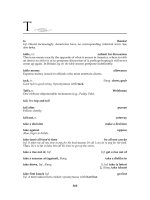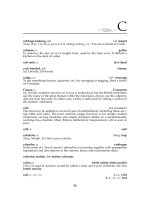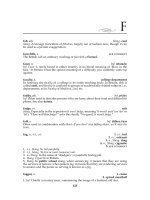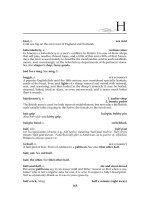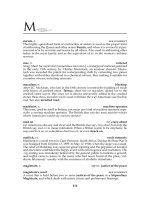British English A to Z - past 9
Bạn đang xem bản rút gọn của tài liệu. Xem và tải ngay bản đầy đủ của tài liệu tại đây (158.12 KB, 21 trang )
288
QAA. See Honours (2).
Q.C. See take silk.
quad, n. approx. campus
Inf. Oxford University term, short for quadrangle. It denotes a square bounded by
college buildings rather than the whole campus. Some American colleges also
use the term quad. The Cambridge equivalent is court.
quadrillion. See Appendix II.D.
Quango, acronym. see comment
Acronym for ‘quasi-autonomous non-governmental organization.’ These are
public bodies receiving government funding, and reporting/advising on official
matters, but independent (in theory) of central government.
quant, n., v.t., vi. boat pole
A quant is a punting pole with a flange near the tip to prevent its sinking into mud,
used to propel the boat along. As a verb, to quant is to pole the boat, or to punt.
quantity, bill of. See bill of quantity.
quantity surveyor materials appraiser
Particularly in the contracting business, with expert knowledge of specifications
and prices.
quarrel with one’s bread and butter Inf. bite the hand that feeds one
Inf. Generally, like its American equivalent, restricted to negative statements, e.g.,
One shouldn’t quarrel with one’s bread and butter. So don’t quit your job until you
have lined up a new one.
quart, n. See Appendix II.C.2.
quarter, n. quarter of a pound
Inf. One asks for a quarter of those chocolates (pointing) at the sweet-shop. Quar-
ter of a pound would sound ponderous in Britain. This would apply equally, of
course, to mushrooms at the greengrocer’s, nails at the ironmonger’s, etc. The
usage has become steadily rarer as metrification has taken hold.
quarter-day, n. approx. due date
Quarter-days are the four days in the year when quarterly payments traditionally
fall due in Britain and are the common dates for tenancy terms. They are: Lady
q
h
Day (March 25); Midsummer Day (June 25); Michaelmas Day (September 29);
Christmas Day (December 25).
quartern, n. see comment
Four-pound loaf of bread, but now archaic.
quaver, n. eighth note
Musical term. See Appendix II.F.
quay, n. wharf/pier
Pronounced key.
(the) Queen 1. see comment
2. see comment
1. Inf. To stay at a dance through the Queen is to stay to the very end. The term
dates from the days when it was usual to play God Save the Queen to close the pro-
ceedings, and the Queen in this context is simply short for the title of the national
anthem.
2. Inf. The toast to the Queen, known as the Loyal Toast.
Queen Mother see comment
The mother of the reigning monarch. Informally, Queen Mum.
Queen’s Speech, n. see comment
A speech written by the government, and delivered by the Queen, outlining the
government’s agenda for the year at the beginning of a new parliamentary ses-
sion. The Queen sits in the House of Lords, and Black Rod summons the Com-
mons to listen.
queer, adj. Inf. queasy
Inf. Unwell or indisposed, not really ill. I went queer has no homosexual connota-
tions whatsoever. See also sick.
queer card, Inf. Slang. oddball
(in) Queer Street Inf. hard up
When the British talk of somebody’s being in Queer Street, they mean that he or
she is in bad trouble, in a bad way, in bad odor. The expression originates in the
custom of writing Quaere (‘enquire’) against a person’s account when it was con-
sidered advisable to make enquiries about him before trusting him.
queer the pitch stymie; thwart
To queer someone’s pitch is to thwart him, to spoil his chances before he begins. A
pitch is part of a cricket ground (field); in football (soccer) pitch is used to describe
the entire playing field. To queer someone’s pitch, then, is to mess up his game, not
literally, but figuratively in the sense of ‘spoiling his chances.’ There are some
however, who claim that this term is not derived from cricket, but from pitch in
the sense of the territorial prerogative of bookmakers and outdoor entertainers
on the streets of London and other cities.
quench, v.t. squelch
To shut (somebody) up.
quench
289
query, n., adv. 1. n. complaint
2. adv. approximately
1. n. This connotation of query is not met with in America. It appears most fre-
quently in the phrase query department of an organization.
2. adv. Query, after an adjective, indicates that the adjective is only approximate,
and the quality or quantity expressed is somewhat doubtful or questionable. A
teacher might characterize a student’s performance (the British often use alpha,
beta, gamma, rather than A, B, C in marking) as beta-alpha query, or beta, query
alpha, i.e., somewhere between A and B but I don’t know exactly where, or beta, query
minus (B, but perhaps a bit closer to B minus).
question in the House see comment
There’ll be a question in the House means, ‘This is going to be brought up in Parlia-
ment at ‘question time’ (the period when Members may question ministers). The
nearest American equivalent would be: This is going to be brought up in Congress,
but more likely before a House or Senate committee. Legislators in the United
States do not, of course, have regular opportunities to question directly the
executive branch of the government.
queue, n., v.i. line; line up
(Pronounced cue.) The verb sometimes takes the form queue up. Foreigners
are often surprised at the self-imposed discipline that leads the British to form
queues. Queue-jumping leads to very positive remonstrations. Americans stand
either in or on a line; but Britons stand only in a queue. See Appendix I.A.1.
quick as thought, Inf. Inf. quick as a wink
quid, n. see comment
Slang. One pound (£), referring to British money, not weight. No American slang
equivalent except buck for dollar. In general use, unlike many other slang currency
terms. See also have a quid each way.
quid each way. See each way.
quieten, v.t., v.i. quiet down
quintillion. See Appendix II.D.
Quis? Who wants this?
Inf. Public school and upper-middle-class cant, pronounced quiz, addressed by an
individual amid a group of his or her peers. The ‘this’ can be anything from the
remains of something being eaten to a comic book or any old bit of anything found
while cleaning out a desk. The affirmative answer is Ego (a suitable Latin answer
to a question in Latin); the negative response is fains. Very rare. See fains I!
quite, adj. Inf. approx. up to snuff
Inf. Quite used as an adjective—not as an adverb modifying an adjective or an
adverb—is found in negative expressions only, such as: He isn’t quite, meaning,
‘He isn’t quite acceptable socially.’ An example of posh language.
quite, adv. absolutely
290
query
Used alone, as a response, expressing more or less emphatic agreement; roughly
equivalent to That goes without saying. ‘Are you sorry the holiday’s over?’
‘Quite.’
quiz, v.t. Inf. poke fun at
Quiz originally meant to ‘make fun of’ and also to ‘look curiously at,’ but because
of the popularity of American television quiz programs, the more common mean-
ing of the word in Britain now is the American one, i.e., to ‘interrogate.’
quod, n. Slang. pokey
Slang. Clink, a slang term in both countries, is derived from an actual prison
of that name in Southwark (London) where there is still a Clink Street. The old
prison is long gone. See also porridge, 2.
quod
291
292
rabbit, n. Inf. dub
Inf. In sports, a beginner or a player of little skill; a duffer.
rabbit on jabber away
Slang. On and on and on. Originates from rhyming slang (see Appendix II.G.3.)
rabbit and pork (shortened to rabbit) for talk.
R.A.C.
Abbreviation for Royal Automobile Club.
race-course, n. racetrack
The British never use race-track for horse racing but do use the term for auto rac-
ing and use dog-track for greyhound racing.
Rachmanism, n. see comment
Inf. The practice of taking over lower-class residential property and deliberately
creating intolerable living conditions in order to force the poor tenants to get out,
so that the landlord can then turn the property to more profitable commercial
uses. The term is derived from a man named Rachman, who in the 1960s pio-
neered in this type of manipulation.
racialist, n., adj. racist
And racialism is racism.
rackety, adj., Slang. Slang. harum scarum
rack-rent, n., extortionate rent
Rack-renting is the wicked practice of exacting excessive rent from tenants.
R.A.D.A. Royal Academy of Dramatic Art
(Pronounciation rhymes with ‘Prada’ as an acronym.)
radiogram, n. radio-phonograph
Radiogram is no longer heard much in Britain or in America.
R.A.F. Royal Air Force
This doughty band, who fought the Battle of Britain, are almost invariably
referred to by their initials.
rag, v.t., v.i., n. 1. v.i., v.t., Inf. fool around; tease
2. n., Inf. stunt; gag
1. Inf. Rag is used intransitively to mean ‘fool around’ or ‘kid around,’ in a man-
ner involving a little mild horseplay. Transitively it means to ‘tease’ or to ‘pull
someone’s leg.’
2. Inf. A rag is a stunt or gag and from this use we get rag-week, which is a week
at the university during which students put on stunts in aid of charity, especially
dressing up and riding around on weird and grotesque floats.
r
h
rag-and-bone man, Inf. Inf. junkman
A peddler who deals in old clothes etc.
raglan. See Balaclava.
raid, n. burglary
In America raid brings up the image of a group assault of one sort or another,
particularly military or police. One reads in British newspapers of a raid made
last night on a house or shop. All it means is a ‘burglary,’ the work of one or more
persons called raiders. A dawn raid in the stock market is something different:
an attempt to gain control of a corporation by swiftly buying up shares of stock
through tempting offers to shareholders, a takeover attempt.
railway, scenic. See scenic railway; switchback.
railway carriage. See carriage.
rain stair-rods Inf. rain cats and dogs
Inf. Synonymous with bucket or tip down; pour with rain. Very old-fashioned,
and exceedingly rare.
raise the wind. See get the wind up.
rake up Inf. dig up
Inf. In the sense of ‘procure with difficulty.’ Also used in Britain in the usual
American sense of ‘bring up an old sore subject,’ like a complaint or a scandal.
rally, v.t., Inf. Inf. pull (someone’s) leg; kid
A good-natured act.
rambler, n. see comment
A person who regularly takes walks in the country for recreation and exercise.
Ramblers’ Association see comment
A large private organization aiming to promote the interests of ramblers, espe-
cially as regards right of access to private land.
ramp, n. 1. bump
2. Slang. racket
3. talk up
1. A special use, to denote a bump deliberately built into a private or restricted
road to encourage people to drive slowly; synonymous with rumble strip. The
term is used as well to denote the point at which the true and the temporary
surfaces join where road repairs are going on. The road signs say beware ramp.
The bump in question is occasioned by the fact that the temporary surface is at a
somewhat higher level.
2. Slang. Ramp is also sometimes used as transitive or intransitive verb meaning
‘swindle.’
3. Especially a product or a company whose prospects one seeks to enhance.
random, adj. Inf. surprising, unexpected
random
293
randy, adj., Slang. Slang. horny
ranker, n. 1. soldier in the ranks
2. officer risen from the ranks
rape, n. see comment
Don’t be alarmed if you see one rape after another when you look at an old map
of the County of Sussex, England. That is what the six old divisions of the county
used to be called.
rare, adj. approx. Inf. great
Inf. Rare is an informal intensive. A rare lot of something is a helluva lot of it. Rare
also implies excellence. A rare something is a splendid something. A rare time is a
swell time; a rare old time is even sweller. But watch out, because in the expression
have a rare time of it, rare time means quite the opposite: a ‘tough time.’
rasher, n. slice or strip of bacon
rate, n. local tax
Usually in the plural, meaning ‘local real estate taxes.’ A ratepayer is a local tax-
payer.
rate, v.t. Inf. hold in high esteem
My friends don’t like the new teacher, but I really rate her.
Rather!, interj., Inf. Inf. And how!
Also translatable as ‘without doubt!’
rating, n. able seaman
Low rank of British sailor, just above ordinary seaman.
rats! Slang. baloney!
Slang. Also ‘Nonsense’ or ‘I can’t believe it.’
rattling, adj., adv. 1. brisk
2. Slang. damned
1. Inf. A rattling pace is a brisk one.
2. Inf. A rattling good story is an unusually good one or more likely a damned good
one. In the adverbial use, rattling has about the same meaning as ripping.
raver, n. Slang. knockout
Slang. In the sense of raving beauty. Synonymous with the old-fashioned Briti-
cisms stunner, smasher, etc.
ravers. See stark ravers.
(have a) rave-up, n. Slang. (have a) ball
Slang. A helluva good time.
razzle, n. Slang. spree; binge; toot
Slang. Americans go on a spree; happy Britons go on the razzle. They also go on the
spree (note the definite article). See Appendix I.A.2.
294
randy
R.D. insufficient funds
These letters are an abbreviation of refer to drawer, a bank indication of incipient
penury.
R.D.C. see comment
These letters are short for Rural District Council, the governing body of a rural
district, once an area comprising a group of parishes, now become obsolete since
the creation of district councils. See council; parish.
reach-me-down, adj. Inf. ready-made
Slang. As a plural noun reach-me-downs became slang for ready-made clothes. It
may have come from the image of a salesperson reaching to get a stock garment
down off a shelf. Not heard now: off-the-peg is the common term, and ready-made is
creeping in. Unrelated to American hand-me-down.
read, v.t. major in
One reads philosophy at Oxford, for example, or law, or chemistry. An American
majors in a subject.
read, n. see comment
A read is a spell of reading, time spent in reading, an opportunity to read: ‘The
reviewer said my novel was a good read.’
reader, n. approx. associate professor
In a British university, the order of academic hierarchy is assistant lecturer, lec-
turer, senior lecturer, reader, and professor. The term professor is more exclusive
than in America, where it covers the grades of assistant professor and associate
professor, as well as (full) professor. See also don; Fellow; master.
Reading (of Parliamentary Bill), n. see comment
Every bill is formally put before Parliament in three successive readings (First,
Second, and Third Readings), when it is discussed and reported on by a commit-
tee.
reading glass magnifying glass
read (someone; something) up read up on (someone; something)
For example, I read him up before interviewing him, or, I read the subject up before
lecturing on it.
(the) ready, n. Slang. dough
Inf. Ready is colloquially short for ready cash. Often, the readies. Synonymous with
brass; dibs; lolly.
ready for off, Inf. ready to go
reafforest, v.t., v.i. reforest
The noun is reafforestation. Both countries use afforest to describe the planting of
land with trees, but they differ in describing the renewal of forest cover.
real jam. See jam.
real jam
295


